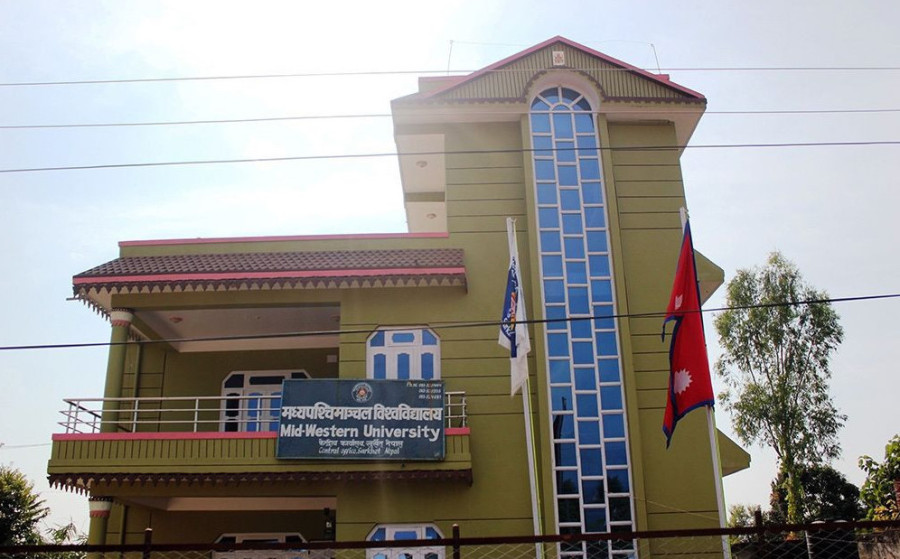National
Politicisation of universities takes toll on credibility
When political affiliation matters more than merit, irresponsible activities will continue, academicians say.
Binod Ghimire
A group of campus chiefs and directors under the Madhya Paschim University resigned en masse on Thursday accusing Vice-Chancellor Nanda Bahadur Singh of using derogatory words against them during a meeting.
Chiefs from four colleges and directors from two departments under the university said they thought it was better to quit rather than work under Singh, who doesn’t respect the dignity of his colleagues and academic institutions.
Singh, who is considered an ally of Prime Minister KP Sharma Oli, was appointed to the position in March.
This is not the first time that people appointed to high offices in various universities have been accused of corruption and misdemeanor.
In 2017 a team under the University Grants Commission had found irregularities at the Lumbini Buddhist University when it granted affiliations. The study conducted by a five-member committee had found that most of the colleges granted affiliation had not fulfilled all criteria set for affiliated colleges.
Though the university, established in 2006, was authorised to provide education on Buddhist Philosophy, Literature and Culture only, it was found to have granted affiliations to engineering and basic science programmes without any expertise in such subjects.
The report said, “The university acted under influence and pressure and that it was also involved in irregularities while granting the affiliations.”
Similarly, Tirtha Khaniya, former vice-chancellor at Tribhuvan University (TU) was accused of plagiarism. While he headed the English Education Department at Tribhuvan University in 2006, Khaniya had lifted a section of an article written by Ferit Kilickaya, associate professor at Middle East Technical University and Mehmet Akif Ersoy University, Turkey.
In an email conversation with the Post in 2015, Kilickaya had said he was shocked to see that a major chunk of his article was lifted by Khaniya. “I tried to get in touch with Khaniya, but could not reach him. I couldn’t file a legal case as I am unaware of Nepal’s legal system,” he told the Post.
Academicians say these incidents show how politicisation of appointments is gradually taking a toll on the credibility of the academic sector. When political affiliation matters more than merit, such irresponsible activities will continue.
“I am saddened to see the increasing incidents of irresponsible activities on the part of different university officials,” Kamal Krishna Joshi, former chair at University Grants Commission, told the Post. “I would blame the politicisation of appointments of vice-chancellors and other officials for such acts.”
Ever since the second people’s movement in 2006, appointments in universities have been made on political “sharing”, with the party in the government appointing people close to it to top positions. Along with the post of vice-chancellor, the positions of rector and registrar are also shared among political parties.
In March last year, Oli appointed his ally Singh to Madhya Paschim University and another ally Yadav Raj Koirala to Purbanchal University
The Nepali Congress and then-Pushpa Kamal Dahal faction within the Nepal Communist Party had expressed its serious reservations over the appointments.
Following their pressure, Oli in September last year appointed Prem Prakash Aryal, an ally of the Nepali Congress as the vice-chancellor of Pokhara University. Similarly, Punya Prasad Regmi was appointed to Agriculture and Forestry University from Dahal’s quota and Oli’s confidante Yadav Lamichhane got to lead Nepal Sanskrit University.
A group of former vice-chancellors led by Kedar Bhakta Mathema, former vice-chancellor at Tribhuvan University, have issued statements and pressured the party leadership to prioritise merit over party affiliations in the appointment process. However, no government has paid attention to their demands.
“The incidents of malpractice and irregularities will continue until the present appointment process continues,” said Mathema.
“No party is concerned about improving the education sector. Their only motive is to reward their allies.”




 9.51°C Kathmandu
9.51°C Kathmandu














